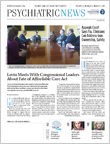A systematic review and meta-analysis published in JAMA in December 2016 suggests that depressive symptoms may be more prevalent among medical students than others of similar age in the general population. The findings, which also revealed that a low percentage of these students seek care, point to the importance of identifying physicians at every stage of their career who are experiencing distress and helping them get the care that they may need.
For the report, Douglas Mata, M.D., M.P.H., of Harvard Medical School and colleagues analyzed 195 studies that examined prevalence of depression, depressive symptoms, or suicidal ideation in 129,123 medical students in 47 countries. A total of 27.7 percent of students screened positive for depression—a percentage the authors noted is “higher than that reported in the general population,” and 11.1 percent reported suicidal ideation during medical school. Among the medical students who screened positive for depression, 15.7 percent reportedly sought psychiatric treatment, additional analysis revealed.
The authors outlined several limitations of the study, including the fact the analyzed data “were almost exclusively derived from self-report inventories of depressive symptoms that varied substantially in their sensitivity and specificity for diagnosing major depressive disorder.” Nonetheless, they wrote, “Combined with the finding that only 15.7 percent of medical students who screened positive for depression sought treatment, the high prevalence of suicidal ideation underscores the need for effective preventive efforts and increased access to care that accommodates the needs of medical students and the demands of their training.”
“What is it about the culture of medicine and of medical education that has allowed this problem to remain so long unaddressed and for studies of interventions to lag so far behind the number of studies of the nature of the problem?” Stuart Slavin, M.D., M.Ed., of St. Louis University School of Medicine wrote in a related editorial.
“[T]he firm belief that more pressure, more hours, and more demands must lead to better educational outcomes” in medicine and “the relative indifference and concerns held by the medical school administration related to student mental health” are two of the factors Slavin suggests may have led to “the delayed and until recently muted response to the long-standing problem of poor mental health of medical students.”
Slavin also wrote of the tendency for medical programs to focus on teaching self-care rather than rethinking issues within the learning environment. Encouraging students to eat healthy, exercise, and meditate “may allow educators to feel comforted by their efforts but also may distract educators from recognizing that the learning environment is at the core of the problem, and more must be done to improve it.”
Slavin concluded, “Medical schools need to step up to address the mental health crisis among medical students, and solutions cannot just come from the mental health side; the problem needs to be viewed as an environmental health issue.”
An abstract of “Prevalence of Depression, Depressive Symptoms, and Suicidal Ideation Among Medical Students” can be accessed
here. The editorial “Medical Student Mental Health: Culture, Environment, and the Need for Change” is available
here. ■
